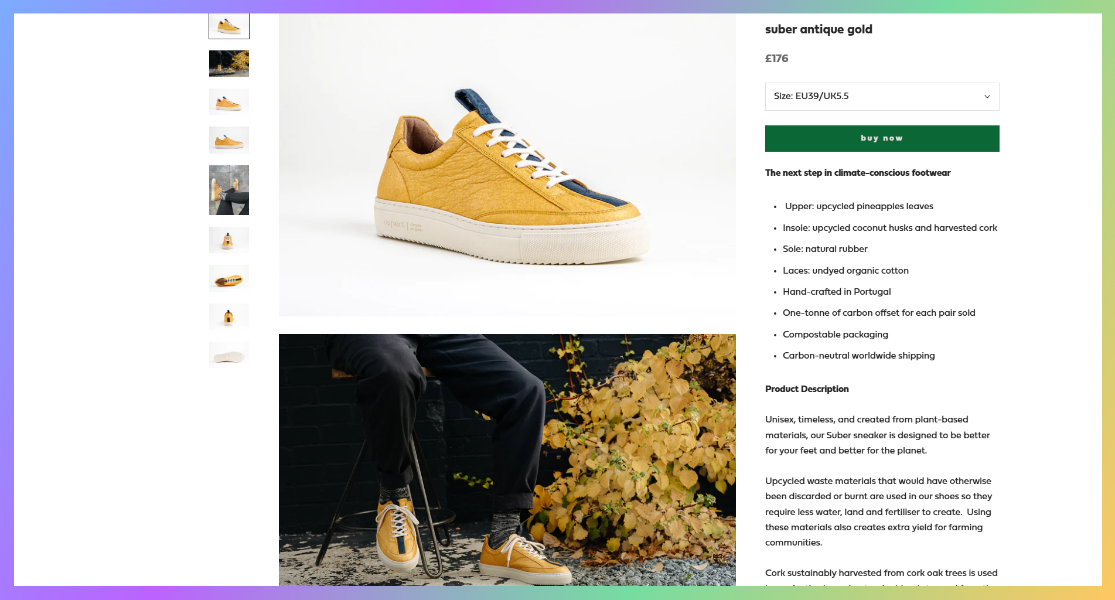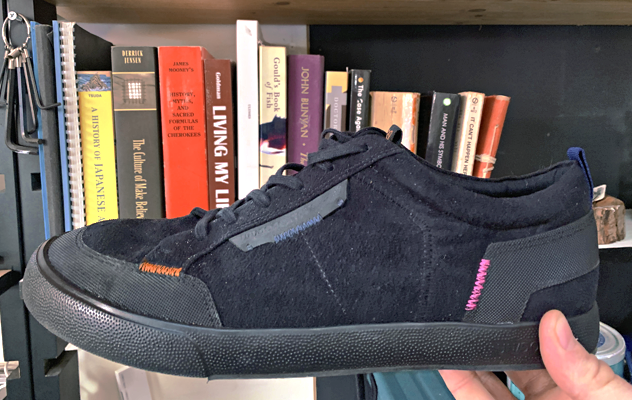At Support4Good, we aim to educate consumers about the best products and impact partners to enable conscious shopping either with us or with different websites out there doing the good work. Today, I want to focus on shoes for the guys and some of the coolest sustainable shoes mens feet will love, what they are doing, what materials they use, and why and how supply chain and logistics factor into the making of a sustainable shoe. I hope you'll learn a lot and be able to make better choices. In the end, we'll reveal a few of my favorite sustainable men's shoes that we hope will soon be available through Support4Good. Let's begin.
When it comes to sustainable shoes, men's and women's, fantastic brands are creating innovative and eco-friendly designs. These brands are making a real difference in the fashion industry by the way they manage their supply chain and logistics to their choice of materials like organic cotton, hemp, and natural rubber.
So that you have a frame of reference, I'll first give the nod to one of the most famous brands, Allbirds, which uses merino wool and sugarcane-based foam for its innovative designs. The brand has also partnered with the Rainforest Alliance (read our somewhat critical Rainforest Alliance article) to ensure that its products are sourced from sustainable forests. They also promote transparency in their supply chain and are committed to reducing their carbon footprint.
With every standard, there is a range of performance and quality. B Corps, for example, allow pretty low environmental scores on a sliding scale when different category scores are very high. This modularity of what constitutes sustainability is problematic. Still, there are exemplary practices that the leading sustainable shoe brands employ to set the bar for the sustainable shoes mens love.

Green chemistry is a science that aims to reduce or cancel the use of hazardous materials in everyday products, including shoes. It is a field of research that focuses on making chemical processes and products more environmentally friendly by reducing waste and emissions. It also looks to replace toxic chemicals with safer alternatives, ensuring that the end product is better for both the environment and human health. Green chemistry is a key part of sustainable production, as it helps reduce the production process's environmental impact while creating a more efficient and cost-effective way to produce goods. Some examples include:
The sustainable shoe supply chain materials like organic cotton, hemp, and natural rubber and logistics differ from the conventional shoe supply chain and logistics in several ways. Eco-friendly production processes use fewer resources and have These types of responsible logistic processes often emphasize minimizing waste, using renewable energy sources, and reducing emissions. Sustainable supply chain management should also focus on ethical sourcing, conscientious disposal, and supporting local economies. Sustainable shoe supply chains and logistics also rely on efficient transportation methods that minimize the product's carbon footprint. Finally, eco-friendly shoe manufacturers often focus on transparency and traceability throughout the supply chain and take special pains to produce ethically.
The central hub of a sustainable shoes men's company is it's factories, so it's worth noting what are some of the measures factories can take in particular:
Planners design sustainable factories to reduce energy consumption and waste. This can include using natural light, investing in energy-efficient equipment, using renewable energy sources, and recycling materials. It also means ensuring that employees have a healthy working environment. Sustainable factories should also prioritize sound sourcing and production processes, ensuring that all materials are ethically sourced and produced in an environmentally-friendly way. On top of that, an eco-conscious factory should adhere to industry-leading workplace safety standards, labor rights, and environmental protection. Finally, the factory should strive to be as transparent as possible, informing consumers about their production methods and the materials used in their products.
A note on materials claimed to be sustainable: Stakeholders in the material tout EVA foam as a biodegradable good, but some environmental concerns are associated with it. It is made from petroleum-based raw materials, which are not renewable resources, and can release toxic chemicals into the air and water during production. The foam is not environmentally-safe, so it can linger in landfills for centuries without breaking down.

Aspect Climate Projects manufactures its shoes in Italy and Portugal, both renowned for their commitment to sustainability and environmental stewardship. To ensure that these factories are held to the standards, Aspect Climate Projects works with the Leather Working Group (LWG) and the European Union (EU) to ensure that their factories comply with accountable manufacturing policies. They are also focused on reducing their carbon emissions and water consumption. To ensure compliance, Aspect Climate Projects subjects its factories to regular audits to ensure that they uphold the maximum sustainability standards.
UNDO For Tomorrow Store has committed to sustainability and ethical production. They use recycled, and organic materials in their shoes and have developed “closed-loop” production processes to minimize waste. They also work with factories in India and Portugal that comply with high workplace safety standards and environmental protection. Similarly, as far as I know, they commit to protecting workers' rights and have implemented a code of conduct that addresses labor rights, safety, and environmental protection.
I have a pair of these shoes and the thing I love about a quality sustainable shoe is how much they stand out from the usual suspects of recognizable brands and the fact that I am reminded with every step I take of a commitment I made to the environment when I bought these shoes. All of these brands will turn heads and make you feel good. It's time to give sustainable shoes a try.

Moea is is a standout among eco shoe brands for its commitment to using natural, recyclable materials to create shoes that are both chic and environmentally friendly. Cork, pineapple husks, algae, and recycled plastic are some of the main ingredients in MoEa shoes. They also use water-based glues and non-toxic dyes. Not only that, but ethical manufacturing processes is important to a company like MoEa, as is paying fair wages and ensuring safe working conditions. All of these features make Moea something special in the sustainable shoe ecosystem.
Saola is unique thanks to its commitment to using eco-friendly materials, investing in ethical production, and reducing environmental impact. Saola's team crafts shoes from environmentally friendly materials such as recycled plastic, organic cotton, and vegan leather. Also, Saola works with factories in Vietnam that are certified by the Fair Wear Foundation, helping to ensure that workers get fair wages and safe working conditions. According to publicly available info, Saola commits to reducing its carbon footprint, investing in renewable energy sources, and using sustainable packaging.
The Saola, or the Pseudoryx_nghetinhensis is an endangered species we wrote about back in 2021, and is native to South Asian countries like Laos and Vietnam. My only critique of Saola shoes is they might give their namesake, the beautiful endangered deer-like creature a bit more credit. The destruction of meaningful things by brands ie., Amazon and Tesla, is a topic for another post.
Thaely is a renewable-principled shoe brand and shines in its commitment to creating quality, snappy shoes with a low environmental impact. Thaely makes their shoes from recycled plastic and discarded fishing nets, and in this way, their methodology is singular in this list. They also use water-based glues and non-toxic dyes. Thaely is committed to reducing its carbon footprint, investing in renewable energy sources, and using sustainable packaging.
If you are an eco-friendly shoemaker, we invite you to join us at Support4Good! The brands featured here that make sustainable shoes for men are some of the best. With Support4Good, you can supplement the work you do internally to green your brand by partnering with our nonprofits and impact partners. With that in mind, if you think your brand might be a fit, or if you are a reader who loves a brand and want us to know about it, give us a shout here.